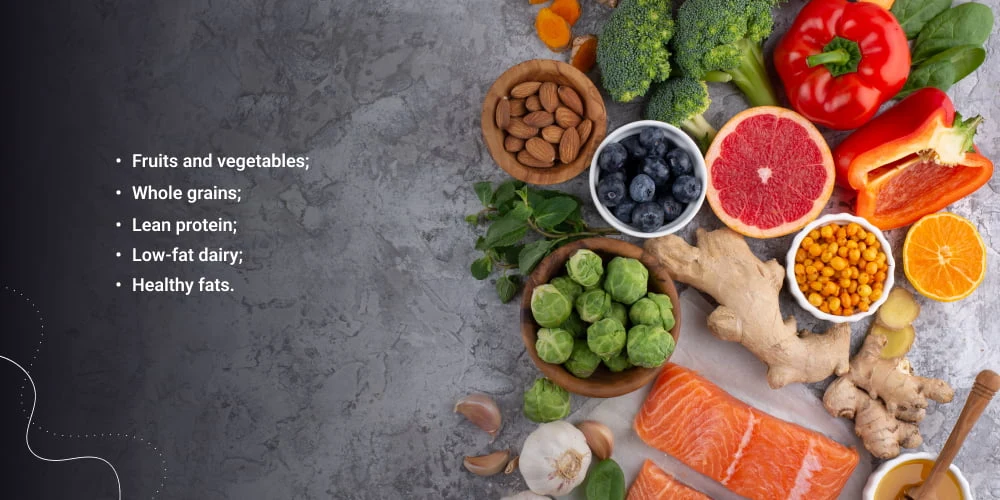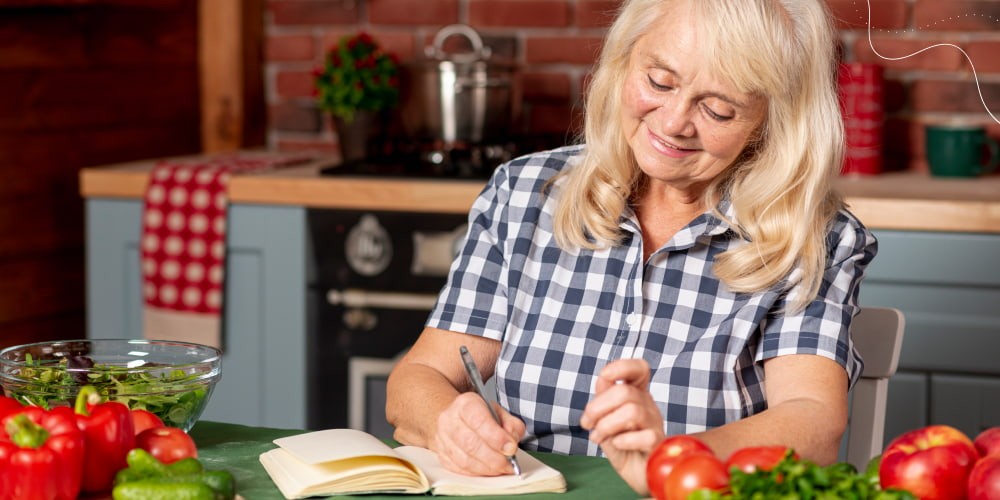It is crucial for stroke patients to maintain a healthy diet. Eating nutritious foods can help reduce the risk of having another stroke and improve overall health. In addition to the fact that healthy food helps prevent a heart attack or helps patients get back on their feet faster after disease, healthy food is just as crucial for our daily lives. There is an expression ‘We are what we eat’ for a reason.
The quality of our life, activity, and general condition directly depends on what kind of food we consume. There are many different factors to consider when creating a diet for stroke prevention, such as:
- Calorie intake.
- Protein levels.
- Fat consumption.
In this article, we will explore the best diet strategies for reducing the risk of stroke. Stay with us and get valuable knowledge!
How Can Eating Help for Stroke Recovery?
A healthy diet is essential for all aspects of your health, including your recovery after a stroke. Eating the right foods can help improve your strength and energy, control your weight, and manage other health conditions such as high blood pressure and diabetes.
There is no one-size-fits-all answer to this question. The best foods to eat after a stroke depends on your individual needs. Talk to your doctor or dietitian to develop a plan that meets your needs.
There is no specific “stroke diet” foods that you must eat. However, certain types of foods are generally recommended for people who have had a stroke. Most often, such food does not contain harmful fats, is rich in slow carbohydrates and gives a lot of vitamins and nutrients to the human body.
These include:
- Fruits and vegetables: Aim for at least five servings per day. Fiber-rich fruits and vegetables can help lower cholesterol and manage blood sugar levels.
- Whole grains: Choose whole grain bread, cereals, pasta, and rice instead of refined grains. Whole grains provide more fiber and nutrients than refined grains.
- Lean protein: Eating lean protein can help build muscle and tissue. Good sources of lean protein include chicken, fish, tofu, legumes, and eggs. A person should eat one gram of protein for 1 kg of muscle to build their body.
- Low-fat dairy: Dairy products provide essential nutrients such as calcium, and vitamin D. Choose low-fat or fat-free options to limit saturated fat and cholesterol.
- Healthy fats: Include healthy fats in your after-stroke diets, such as olive oil, nuts, and avocados. These fats can help improve blood cholesterol levels and reduce inflammation.
Our habits greatly influence our lives. It is enough to remove fatty foods and start exercising more. You will notice how you begin to walk without shortness of breath, and climbing to the fifth floor will not be such a problem. To improve your condition, you do not always need to buy expensive medications or look for a pill that will cure you of everything. It will be enough to change your eating habits, and the result will not be long.
What can help prevent a stroke? – it is a valuable article that helps discover more ways to avoid a stroke.
How Does a Person Eat After He Has a Stroke?
A person that has had a stroke may have difficulty eating due to:
- Weakness.
- Paralysis.
- Problems with swallowing.
If you are having trouble eating, talk to your doctor or a dietitian. They can help you develop a plan to ensure you get the nutrients you need. If you have difficulty swallowing, your doctor may recommend a feeding tube or other treatments.
If you can eat on your own, some general guidelines can help. These include:
- Eating small meals more often throughout the day rather than large meals.
- Chewing food slowly and thoroughly.
- Avoiding hard-to-chew foods such as raw fruits and vegetables, tough meats, and crunchy cereals.
- Drinking plenty of fluids to avoid dehydration.
- Sitting up straight while eating to prevent choking.
The most important thing for any illness is to contact your doctor. Each organism is individual, and only a doctor can prescribe the correct and effective treatment for each patient.
Best Strategies With Recipes for Stroke Patients
Many different strategies can be helpful for people who have had a stroke. Some general tips include eating small meals more often, chewing food slowly and thoroughly, avoiding hard-to-chew foods, and drinking plenty of fluids. Additionally, limiting your intake of salt, sugar, and alcohol is essential.
Many resources are available online and in cookbooks, if you are looking for specific recipes. The American Heart Association website has a section dedicated to diets for patients with stroke, which includes many recipes that would be appropriate for people who have had a stroke.
The “EatWell” section of the Mayo Clinic website also has a variety of healthy recipes. There are also many cookbooks specifically for people with dietary restrictions due to medical conditions, including cookbooks for people who have had a stroke. Talk to your doctor or dietitian to find out which resources would be most helpful.
Some specific recipes that may be appropriate for patients who have had a stroke include:
- Roasted salmon with vegetables.
- Quinoa salad with black beans and avocado.
- Chicken and rice soup.
- Vegetable stir-fry.
- Fruit smoothie.
These are just a few examples. Many other healthy diets would be appropriate for people after a stroke. Talk to your doctor or dietitian to find out which recipes would be most appropriate for you.
What Foods to Avoid for Stroke Patients?
There are certain foods that stroke patients should avoid. These include:
- Foods such as processed foods, canned soups, and fast foods are high in salts. All stroke patients will have to forget food at McDonald’s or KFS for a while. It would be best if you also avoid your favorite street food truck. There is usually a lot of sunflower oil and fatty foods in such food.
- Foods such as candy, cookies, and cakes are high in sugar. You should also avoid your favorite sodas and juices from the store. If you are low on sugar, you can replace it with fruit, but you should be careful even with them.
- Alcohol. Now sitting every Friday with a bottle of beer watching a Yankees game is forbidden for you. Now you can only drink fresh carrot juice or water.
It is also essential to avoid hard-to-chew foods, such as raw fruits and vegetables, tough meats, and crunchy cereals. If you have difficulty swallowing, talk to your doctor about foods to avoid.
Bottom Line
There is no one-size-fits-all diet for stroke survivors. The optimum diet for you will be determined by your unique requirements. Consult your doctor or a dietician to design a plan that is appropriate for you. Fruits and vegetables, complete grains, lean protein, and low-fat dairy are advised as healthy eating.
It is also critical to minimize your intake of salt, sugar, and alcohol. There are several tools available to assist you in finding recipes that meet your new dietary requirements.
Furthermore, having only high-quality and competent help is critical. Call 214-619-1910 or use the contact button to do so.
FAQs
- What is the best diet to prevent a stroke?
The optimal diet for stroke prevention or recovery is one that is low in sugar, fat, and alcohol while being high in healthy fats, vitamins, and minerals. Meat, fruits, and vegetables are examples of these foods. You should never consume fast food, greasy meals, soda, or alcohol.
- Why is stroke dangerous?
Brain cells begin to die within minutes of being deprived of oxygen and nutrition. A stroke can be caused by unexpected bleeding in the brain. A stroke is considered a medical emergency. A stroke can result in long-term incapacity, death, or irreversible brain damage.
- Is banana good for stroke?
A study by British and Italian researchers found that eating three bananas a day (breakfast, lunch, and dinner) provides enough potassium to reduce the brain’s blood clots risk by about 21%.
- What can I drink to prevent a stroke?
There is no such thing as a drink that has such an impact. However, there are some beverages that might harm your health. Alcoholic beverages, soda, and other drinks high in sugar and food coloring should be avoided or limited in your diet. Drink herbal tea, water, or natural juice diluted with water instead.














Please, leave your review
4 Comments
Berhanu Gebeyehu
18/07/2023
This is good for a stroke patients.
Mary's daughter
30/08/2023
What? Only carrot juice and water?
Para
11/10/2023
If a stroke patient can sip water slowly, then why add thickener to the water?
James malone
24/01/2024
Can a stroke declne
Write a comment: